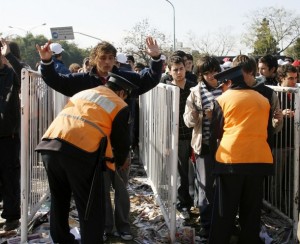Kick the Easy Field Goal, Or Go for the Pat-Down?
 With the Super Bowl just days a way, it’s hard not to get in the Football spirit. Hold on there! A recent case out of San Francisco highlights something many sports fans around the country have been tolerating for years: pat down checks at sporting events. To some in the post 9/11 world it is a necessary evil. It even says it on the back of your ticket: come to watch the game, and we will search you. To plaintiff and 49er fan Daniel Sheehan, however, the time has come to put a stop to it.
With the Super Bowl just days a way, it’s hard not to get in the Football spirit. Hold on there! A recent case out of San Francisco highlights something many sports fans around the country have been tolerating for years: pat down checks at sporting events. To some in the post 9/11 world it is a necessary evil. It even says it on the back of your ticket: come to watch the game, and we will search you. To plaintiff and 49er fan Daniel Sheehan, however, the time has come to put a stop to it.
The term “pat down” comes from the common police procedure of frisking suspects on the outside of their clothing for weapons. If police have a reasonable suspicion that a suspect is armed and dangerous and has committed a crime, the police can stop and frisk.
With the threat of terrorism, the pat down search has become more and more common amongst private citizens and businesses. Almost every major sporting venue regularly conducts pat down searches on its patrons.
According to the original court documents that threw out Mr. Sheehan’s suit, they can do this because Mr. Sheehan and others agree to the pat down when they purchase their tickets. This, coupled with potential loss of life that can be spared by conducting relatively inconvenient pat downs, furthermore led the California Court of Appeals to deny Mr. Sheehan’s appeal. He has now taken the matter up with the California Supreme Court.
Although Mr. Sheehan may be on to something when he says the 49ers are more worried about fans sneaking in beer rather than bombs, Mr. Sheehan and others also know that stadiums would face a much bigger problem if they did nothing. But what about places other than football stadiums? Could Wal-Mart greeters turn into Wal-Mart feelers?
At its most basic level, people can’t just touch you if they feel like it. That could be a battery. Even an unwanted hug or slap on the back could be a battery. If you walk into your local cafe and the barista starts feeling your pockets for no reason, feel free to throw your iced coffee at him.
But if there is a sign on the door that says “if you enter, you will be searched,” then the game changes. Between private citizens and businesses, there are no 4th amendment unreasonable search concerns. Much to the consternation of Supreme Court Judges like Antonin Scalia however, there may be privacy concerns. Most of the concerns go away the minute you know you will be searched and walk in, but a businesses ability to safeguard the safety of itself and its customers can only go so far. Wal-Mart, for instance, can zoom in on you as much as it wants with its cameras, but would never be able to strip search you just for walking through the front door. (And they would go out of business anyway).
Will society ever get to the point that you need to pop your trunk to drive into the Ikea parking garage? Probably not. But it is a common misconception to believe that the same constitutional rights apply to both police conduct and the transactions of private parties.
With that said, and now that you’ve read this piece, can you empty your pockets for me?

Comments